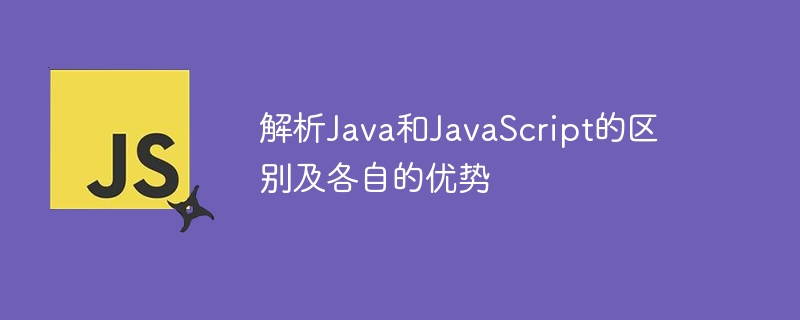Home >Web Front-end >JS Tutorial >Analyze the differences between Java and JavaScript and their respective advantages
Analyze the differences between Java and JavaScript and their respective advantages
- 王林Original
- 2024-03-23 08:12:04671browse

Java and JavaScript are two very popular programming languages. Although they are similar in name, they are actually very different in terms of syntax, usage and running environment. This article will analyze the differences between Java and JavaScript in detail in terms of syntax, features and respective advantages, and explain it with code examples.
1. Syntax difference
- Java: Java is an object-oriented programming language. It has strict syntax rules and requires a compiler to convert the code into bytecode. Then executed by JVM (Java Virtual Machine). Java's syntax is relatively strict, requiring the definition of structures such as classes and methods, and strong type checking.
- JavaScript: JavaScript is an interpreted language that is mainly used for front-end development to add dynamic effects to web pages. The syntax of JavaScript is relatively flexible and does not require compilation. It can be directly embedded into HTML for execution. JavaScript is a dynamically typed language that can perform type conversions at runtime.
2. Feature differences
- Java: Java is a highly versatile programming language that can be used to develop various types of applications, such as desktop applications. , Web applications, mobile applications, etc. Java has rich class libraries and a powerful ecosystem that can help developers quickly build robust applications.
- JavaScript: JavaScript is mainly used for web development to control the interaction and dynamic effects of web pages. JavaScript can be combined with HTML and CSS to achieve rich user interface interaction effects. JavaScript can also be used for server-side development. The emergence of technologies such as Node.js has given JavaScript more application scenarios in back-end development.
3. Their respective advantages
-
Advantages of Java:
- Powerful cross-platform features: Java code can be used in different Running on the operating system, the developed programs have better compatibility.
- Static type checking: Java performs code type checking during the compilation phase, which helps reduce runtime errors.
- Multi-threading support: Java provides rich multi-threading support to facilitate the development of concurrent programs.
// Java示例代码
public class HelloWorld {
public static void main(String[] args) {
System.out.println("Hello, World!");
}
}-
Advantages of JavaScript:
- Flexible syntax: JavaScript’s syntax is flexible and concise, suitable for rapid development. Functional programming and asynchronous operations are characteristics of JavaScript.
- Front-end interactive effects: JavaScript can achieve rich front-end interactive effects through DOM operations to improve user experience.
- Rich ecosystem: JavaScript has a huge open source community and rich third-party libraries, which can easily integrate various functional modules.
// JavaScript示例代码
function greet() {
return "Hello, World!";
}
console.log(greet());To sum up, although Java and JavaScript are very similar in name, they are actually two completely different programming languages, each with unique advantages and applications. Scenes. Developers can choose the appropriate language for development based on specific project needs to achieve the best results.
The above is the detailed content of Analyze the differences between Java and JavaScript and their respective advantages. For more information, please follow other related articles on the PHP Chinese website!

